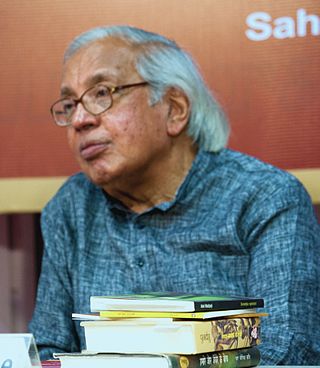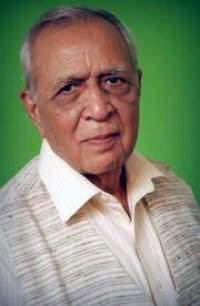
Chakravarti Rajagopalachari BR, popularly known as Rajaji or C.R., also known as Mootharignar Rajaji, was an Indian statesman, writer, lawyer, and independence activist. Rajagopalachari was the last Governor-General of India, as when India became a republic in 1950 the office was abolished. He was also the only Indian-born Governor-General, as all previous holders of the post were British nationals. He also served as leader of the Indian National Congress, Premier of the Madras Presidency, Governor of West Bengal, Minister for Home Affairs of the Indian Union and Chief Minister of Madras state. Rajagopalachari founded the Swatantra Party and was one of the first recipients of India's highest civilian award, the Bharat Ratna. He vehemently opposed the use of nuclear weapons and was a proponent of world peace and disarmament. During his lifetime, he also acquired the nickname 'Mango of Salem'.
Marathi literature is the body of literature of Marathi, an Indo-Aryan language spoken mainly in the Indian state of Maharashtra and written in the Devanagari and Modi script.

Mahasweta Devi was an Indian writer in Bengali and an activist. Her notable literary works include Hajar Churashir Maa, Rudali, and Aranyer Adhikar. She was a leftist who worked for the rights and empowerment of the tribal people of West Bengal, Bihar, Madhya Pradesh and Chhattisgarh states of India. She was honoured with various literary awards such as the Sahitya Akademi Award, Jnanpith Award and Ramon Magsaysay Award along with India's civilian awards Padma Shri and Padma Vibhushan.

Dalit, also some of them previously known as untouchables, is the lowest stratum of the castes in the Indian subcontinent. Dalits were excluded from the fourfold varna of the caste hierarchy and were seen as forming a fifth varna, also known by the name of Panchama. Several scholars have drawn parallels between Dalits and the Burakumin of Japan and the peasant class of the medieval European feudal system.

The Sahitya Akademi, India's National Academy of Letters, is an organisation dedicated to the promotion of literature in the languages of India. Founded on 12 March 1954, it is supported by, though independent of the Indian government. Its office is located in Rabindra Bhavan near Mandi House in Delhi.

Mannu Bhandari was an Indian author, screenplay writer, teacher, and playwright. Primarily known for her two Hindi novels, Aap Ka Bunty and Mahabhoj (Feast), Bhandari also wrote over 150 short stories, several other novels, screenplays for television and film, and adaptations for theater. She was a pioneer of the Nayi Kahani movement in Hindi literature, which focused on the aspirations of the emerging Indian middle class, and her own work is notable for its depiction of the inner lives of middle class working and educated women. Her work tackles themes of family, relationships, gender equality, and caste discrimination in India.
Nirupama Dutt is an Indian poet, journalist and translator. She writes poems in Punjabi, and translates them into English herself.
The Sahitya Akademi Fellowship is a literary honour in India bestowed by the Sahitya Akademi, India's National Academy of Letters. It is the highest honour conferred by the Akademi on a living writer, the number of fellows at no time exceeding 21. Elected from among writers thought by the Akademi to be of acknowledged merit, the fellows are sometimes described as the "immortals of Indian literature."
Omprakash Valmiki was an Indian writer and poet. Well known for his autobiography, Joothan, considered a milestone in Dalit literature. He was born at the village of Barla in the Muzzafarnagar district of Uttar Pradesh. After retirement from Government Ordnance Factory he lived in Dehradun where he died of complications arising out of stomach cancer on 17 November 2013.

Ashok Vajpeyi is an Indian Hindi-language poet, essayist, literary-cultural critic, apart from being a noted cultural and arts administrator, and a former civil servant. He was chairman, Lalit Kala Akademi India's National Academy of Arts, Ministry of Culture, Govt of India, 2008–2011. He has published over 23 books of poetry, criticism and art, and was awarded the Sahitya Akademi Award given by Sahitya Akademi, India's National Academy of Letters, in 1994 for his poetry collection, Kahin Nahin Wahin. His notable poetry collections include, Shaher Ab Bhi Sambhavana Hai (1966), Tatpurush (1986), Bahuri Akela (1992), Ibarat Se Giri Matrayen, Ummeed ka Doosra Naam (2004) and Vivaksha (2006), besides this he has also published works on literary and art criticism: Filhal, Kuchh Poorvagrah, Samay se Bahar, Kavita ka Galp and Sidhiyan Shuru ho Gayi Hain. He is generally seen as part of the old Delhi-centric literary-cultural establishment consisting of bureaucrat-poets and academicians like Sitakanta Mahapatra, Keki Daruwalla, J.P.Das, Gopi Chand Narang, Indra Nath Choudhari and K.Satchidanandan.
Chetram Jatav was an Indian revolutionary who participated in Indian Rebellion of 1857.

Bholabhai Patel was an Indian Gujarati author. He taught numerous languages at Gujarat University and did comparative studies of literature in different languages. He translated extensively and wrote essays and travelogues. He was awarded the Padma Shri in 2008.
Manorama Jafa is an Indian author of more than 100 books for children, as well as feminist novels for adults, and academic research and writing on children's literature. She has served as Secretary General of the Association of Writers and Illustrators for Children and as the Secretary General of the Indian National Section of the International Board on Books for Young People. She was awarded the Padma Shri in 2014, and the Order of the Rising Sun in 2016.

Laltluangliana Khiangte is a Mizo academic, playwright and poet of Mizo literature. He was the principal of the Serampore College and a former professor at Pachhunga University College and the North Eastern Hill University. He is presently serving as the senior most professor at the Department of Mizo at Mizoram University. He is a recipient of the Pu Buanga Award, the highest literary award of the Mizo Academy of Letters. The Government of India awarded him the fourth highest civilian honour of the Padma Shri, in 2006, for his contributions to Indian literature.
Chaman Lal retired as a professor in Hindi translation from Jawaharlal Nehru University. He is now Honorary advisor to Bhagat Singh Archives and Resource Centre, Delhi Archives of Delhi Govt.cn date is March 2021
Subhash Chandra, better known by his pen name, Mudrarakshas the eminent writer was a Hindi playwright, journalist, activist, thinker and cultural personality and critic from Lucknow, India. He was born in Lucknow on 21 June 1933 and died in the city on 13 June 2016, after illnesses due to old age.

The Gujarat Sahitya Akademi or Gujarat Sahitya Academy, established in 1981, is a government institution dedicated to the development of the languages spoken in Gujarat, India and their literature. Gujarati, an official language of Gujarat, is one of them; the others are Hindi, Sanskrit, Kutchi, Sindhi and Urdu. As of 2022, Bhagyesh Jha is the chairman of the Akademi.

Sheoraj Singh Bechain is an Indian poet, short story writer, and essayist. When he started writing and progressing academically, he adopted the pen name "Bechain". He was appointed Professor on an unreserved position in the Department of Hindi at the University of Delhi in 2010 and became the first Dalit Professor in the department. He is currently serving as the Head of the Hindi Department at the University.
S.R. Harnot is a creative writer from Himachal Pradesh, India. He is noted for his numerous poems, short stories, and novels in Hindi and Pahadi. He has received multiple awards on the state, national, and international levels. His is work has inspired both a considerable body of scholarship and a number of adaptations in various artistic forms by others. Harnot writes mostly about societal issues such as socio-cultural change, casteism, environmental degradation, corporate greed, and official corruption in the everyday life of contemporary rural western Himalayas.









